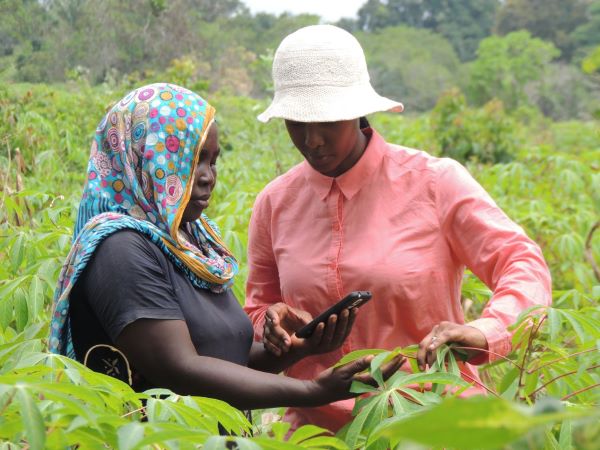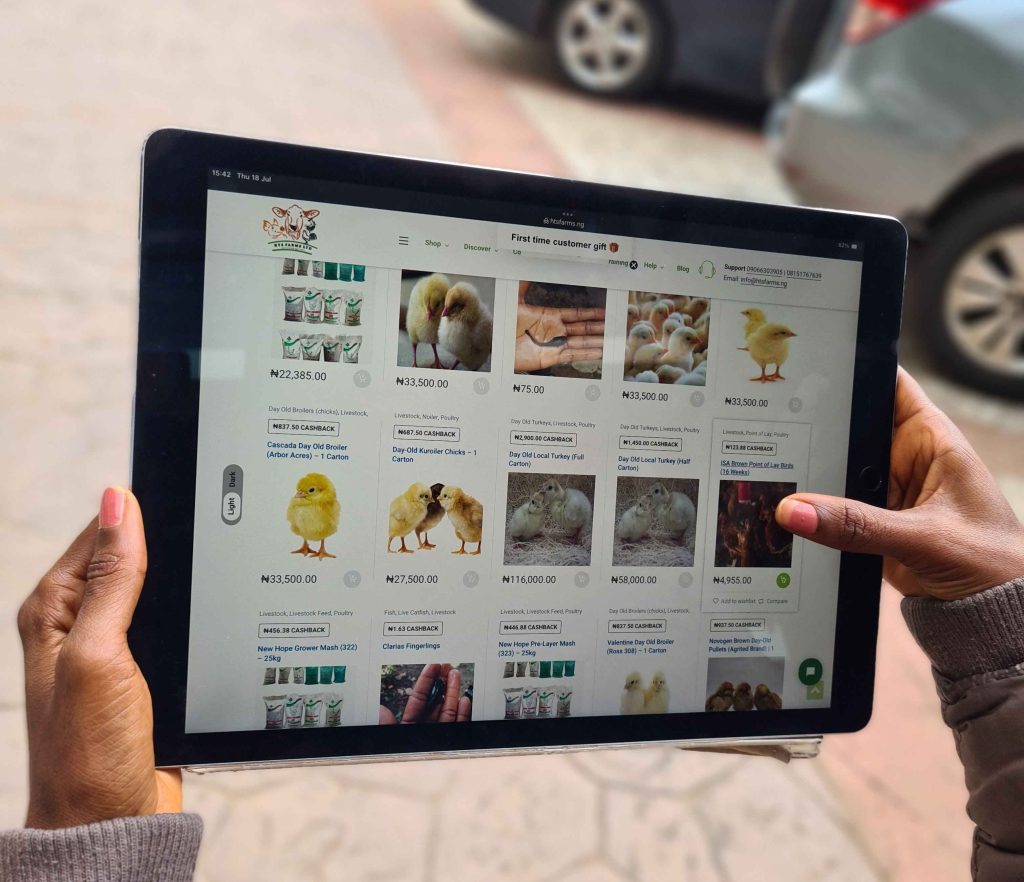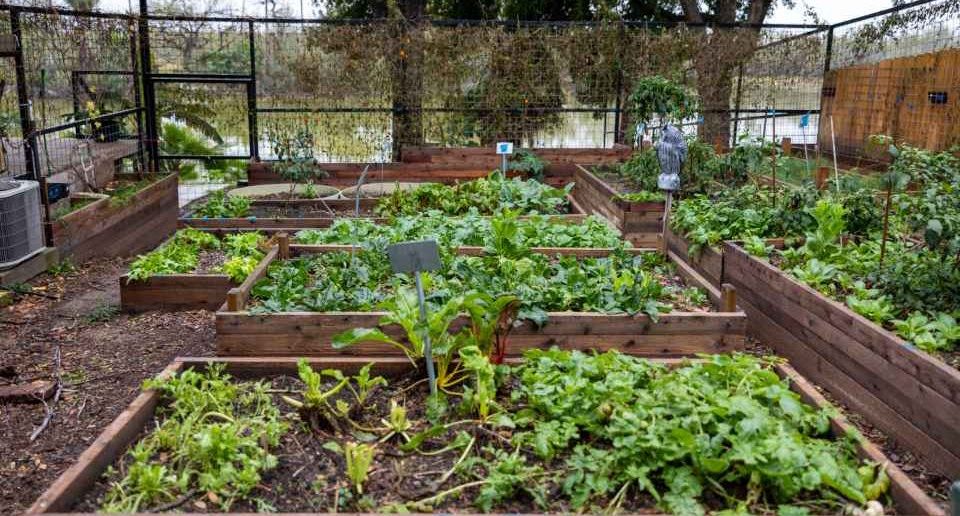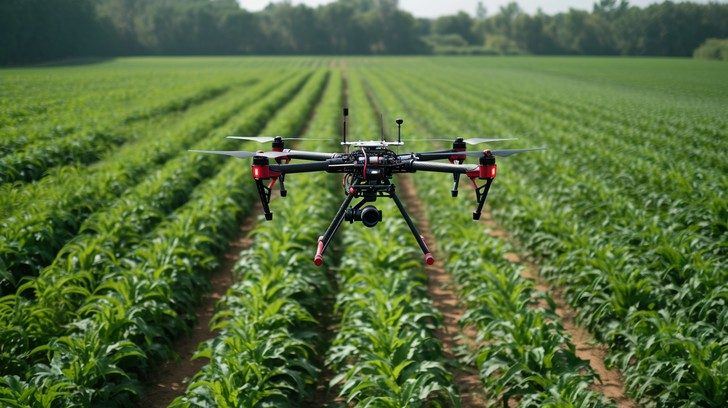
The Rise of E-commerce in Nigerian Agriculture
Table of Contents
Introduction
The Evolution of Agriculture in Nigeria
The Emergence of E-commerce in Nigerian Agriculture
4.1. Technological Advancements
4.2. Government and Private Sector Initiatives
HTSF Global’s E-commerce Platforms
5.1. Overview of HTSFarms
5.2. Impact on Farmers and Markets
Challenges and Solutions in E-commerce Adoption
The Future of E-commerce in Nigerian Agriculture
Conclusion
References
Introduction
Agriculture is the backbone of Nigeria’s economy, employing a significant portion of the population and contributing substantially to her GDP. Despite its importance, the sector faces numerous challenges, particularly in access to quality farm inputs, market access, and efficiency. The difficulty in obtaining high-quality seeds, fertilizers, and other essential inputs has significantly hindered agricultural productivity. Traditional agricultural practices and market access issues have often prevented the sector from realizing its full potential.

However, with the advent of digital technologies, e-commerce is emerging as a transformative force, connecting farmers directly to input markets and revolutionizing agricultural practices. This article explores the rise of e-commerce in Nigerian agriculture, focusing on HTS Farms‘ pioneering platforms and their impact.
The Evolution of Agriculture in Nigeria
Nigeria’s agricultural landscape has evolved significantly over the decades. Historically, the sector was dominated by subsistence farming, with smallholder farmers growing food primarily for their consumption. Over time, a shift towards more commercially-oriented practices has been driven by increased urbanization, growing food demand, and government policies promoting agricultural commercialization. The Green Revolution of the 1970s and 1980s introduced improved crop varieties and farming techniques, which significantly boosted productivity.

However, despite these advancements, the sector continues to face persistent challenges, particularly in accessing quality farm inputs. The limited availability of modern seeds, fertilizers, and other essential inputs has often prevented farmers from maximizing their yields and fully participating in larger markets. Inadequate infrastructure and insufficient financial services compound these issues, making it difficult for farmers to adopt the innovations necessary for thriving in a more commercialized agricultural environment.
The Emergence of E-commerce in Nigerian Agriculture
The advent of e-commerce in Nigerian agriculture represents a significant shift from traditional market practices. E-commerce platforms leverage digital technologies to connect farmers directly with consumers and businesses, offering numerous benefits.
HTS Farms: Leading the Agrotech Revolution in Nigeria
HTS Farms stands as a leader in the Nigerian agrotech sector, known for its innovative approach and commitment to sustainability through diverse services and technological advancements. HTS Farms is transforming agriculture in Nigeria and ensuring a stable food supply for the future.
Achievements and Impacts

HTS Farms has made remarkable strides in transforming Nigeria’s agricultural sector through our comprehensive e-commerce marketplace. With a thriving community of 2,500 registered users and 2,000 paying customers, we’ve established a robust network of farmers and agricultural stakeholders. Our platform reaches an online audience of over 10,000 each month, reflecting our growing influence in the sector.
To ensure a diverse and reliable supply chain, we’ve partnered with over 200 verified suppliers and registered more than 2,700 products. This extensive collaboration not only enhances the availability of quality farm inputs but also strengthens our commitment to empowering Nigerian farmers with the resources they need to succeed.
Our emphasis on sustainable farming practices not only promotes environmental protection but also ensures the longevity of Nigeria’s agricultural sector. With an impressive track record of delivering over 45,000 orders, HTS Farms stands out for its efficiency, reliability, and strong customer relationships. Through these efforts, we’ve made substantial contributions to economic growth and community development, reinforcing our role as a key driver of progress in Nigerian agriculture.

Technological Advancements
The proliferation of mobile phones and internet access has revolutionized e-commerce in Nigeria, particularly in the agricultural sector. Improved internet connectivity, even in rural areas, has further enabled farmers to engage in digital marketplaces, breaking down barriers that once limited their reach.
Technological advancements, such as mobile money services, online payment systems, and digital marketing tools, have been instrumental in this transformation. These technologies not only ensure secure transactions and provide platforms for advertising agricultural products but also facilitate seamless communication between buyers and sellers. Most importantly, they have significantly improved access to quality farm inputs. Farmers can now easily source seeds, fertilizers, and other essential inputs online, enhancing their productivity and contributing to the overall growth of the sector.
Government and Private Sector Initiatives
Both the government and private sector have recognized the potential of e-commerce in transforming agriculture. Various initiatives have been launched to promote digital literacy, improve internet infrastructure, and encourage the adoption of e-commerce platforms among farmers. Government initiatives such as the National Digital Economy Policy and Strategy aim to enhance digital infrastructure and literacy across the country. The private sector, including tech startups and agricultural companies, has also invested in developing e-commerce platforms tailored for farmers. These efforts are geared towards creating an enabling environment for digital agriculture.
HTSF Global’s E-commerce Platforms
HTSF Global has been at the forefront of leveraging e-commerce to empower farmers through their Agricultural marketplace, HTS Farms. This innovative platform is designed to address the unique challenges faced by farmers and provide them with tools to succeed in the digital economy.
Impact on Farmers and Markets
HTS Farms has significantly impacted the agricultural sector by:
Increasing Access to Quality Inputs: Farmers can easily access high-quality seeds, fertilizers, and other farm inputs through the platform, ensuring they have what they need for a successful planting season.
Timely Access: By leveraging e-commerce, farmers can order and receive necessary inputs in a timely manner, which is crucial for planting cycles.

Ensuring Fair Prices: By eliminating middlemen, HTS Farms ensures that farmers receive fair prices for their inputs. This direct-to-consumer model allows farmers to capture more value from their purchases.
Improving Productivity: Access to high-quality inputs and timely information helps farmers increase their productivity and yield, eliminating constant search, thereby contributing to greater food security, optimum productivity and in extension, economic stability.
Challenges and Solutions in E-commerce Adoption
Despite the benefits, the adoption of e-commerce in agriculture faces several challenges:
Digital Literacy: Many farmers lack the skills to use e-commerce platforms effectively. HTS Farms addresses this challenge through training programs that teach farmers how to navigate the platform, shop for products, and conduct transactions seamlessly.
Internet Connectivity: Poor internet access in rural areas can hinder e-commerce adoption. Solutions include developing offline capabilities like USSD for the platform and partnering with telecom providers to improve connectivity in underserved areas.

Trust and Security: Building trust in digital transactions is crucial for the success of e-commerce. HTS Farms ensures secure payment gateways and transparent processes to build confidence among users. Regular feedback and review mechanisms are also in place to maintain high standards of service.
The Future of E-commerce in Nigerian Agriculture
The future of e-commerce in Nigerian agriculture is incredibly promising, with technology set to play a transformative role in the sector. Continued advancements, such as AI-driven advisory services and blockchain for supply chain transparency, are expected to propel the industry forward, making it easier for farmers to access quality farm inputs with precision and reliability.
As digital literacy among farmers increases and internet infrastructure improves, e-commerce adoption will become even more widespread. Innovations in mobile technology, including the development of affordable smartphones and data plans, will further simplify access to e-commerce platforms, enabling farmers across Nigeria to easily source seeds, fertilizers, and other essential inputs online. This ease of access will not only enhance productivity but also foster greater market participation.
Crucial to this evolution will be the partnerships between the government, private sector, and international organizations.

These collaborations will be key to creating an enabling environment for digital agriculture, ensuring that farmers have the resources, knowledge, and tools needed to thrive in the modern agricultural landscape. As these elements come together, the future of e-commerce in Nigerian agriculture will be defined by increased efficiency, transparency, and accessibility, driving sustainable growth across the sector.
Conclusion
E-commerce is revolutionizing Nigerian agriculture by providing farmers with easy and timely access to quality farm inputs and planting materials. HTSF Global’s platforms like HTS Farms are leading the charge, demonstrating the transformative potential of digital technologies in agriculture. As more farmers embrace e-commerce, the agricultural sector in Nigeria stands to become more efficient, equitable, and prosperous.

References
- Food and Agriculture Organization. (2022). The State of Food and Agriculture 2022. FAO, Rome.
- Nigerian Bureau of Statistics. (2024). Agricultural Survey Report. NBS, Abuja.
- Central Bank of Nigeria. (2023). Financial Inclusion Report. CBN, Abuja.
- Federal Ministry of Agriculture and Rural Development. (2023). Annual Report. FMARD, Abuja.
- GSMA. (2023). The Mobile Gender Gap Report 2023. GSMA.
